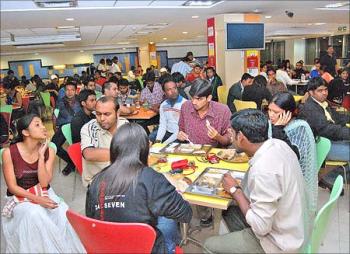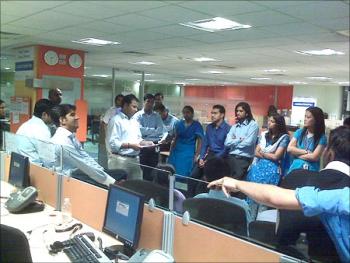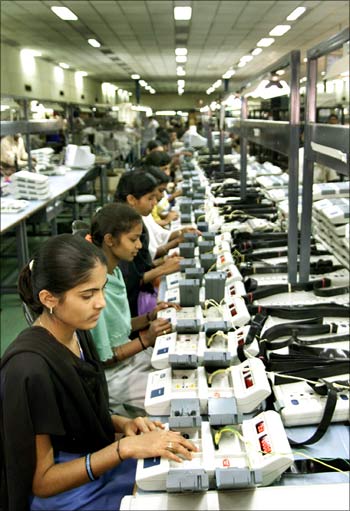Photographs: Rediff Archives Amit Bansal, Purpleleap.com
India has seen a huge rise in the number of professional colleges in the past few years. While industrial growth has also been rapid, the demand for fresh graduates is nowhere near the supply. In fact, the reality is that barely twenty five percent of the fresh graduates passing out of these professional colleges every year are "employable". In this intensely competitive environment, how can fresh graduates ensure that they are among the fortunate few who are finally selected?
Let's take the example of Rohit, who is applying for the role of content writer at ABC Ltd. Rohit walks into the interviewer's chamber with sandals on feet and his shirt hanging out. The Interviewer asks him to sit down and he slumps in the chair which is offered.
Another candidate Sheela, upon being asked about her weaknesses, responds by saying she does not have any weaknesses at all!
...
The author is a Career Counselor and trainer who heads PurpleLeap (http://www.purpleleap.com/), a Pearson-Educomp company, that works with colleges to make students employment-ready.
Young grads: How to improve your employability
Rahul is asked to estimate the number of lampposts in the city of Pune. He immediately responds by saying Pune has 375 lamp posts. When further questioned about how he arrived at that number, he responds by saying that he made a wild guess and in any case, there is no way that the interviewer would be able to establish whether he is right or wrong.
Sumedha, while conversing with interviewer says, "yesterday I going to Indira Market. Having lot of fun there."
Upon being asked some basic questions on his area of specialisation, Rahul is not able to answer even one such question.
These are some examples of some situations which establish non-employability of fresh graduates.
Young grads: How to improve your employability
In order to avoid making such errors, the first step is to analyse on the following lines:
What you are: your self-awareness in terms of your values, strengths, weaknesses, achievements, challenges and learnings.
A SWOT (strengths, weaknesses, opportunities and threats) analysis is a very useful tool for self-awareness. It involves the identification of personal and professional strengths and weaknesses of an individual.
a. What you want to be
Figure out your goals with respect to the industry, organisation, and the role you aspire for.
Talking to people from industry, decoding organisational structures, type of work that organisations do and their future plans helps arrive at an understanding of the expectations of industry. This, in turn, helps a fresh graduate to define roles that would be appropriate for them.
b. What you need to do to become what you want to be: your development plan
It is important to work on developing the following professional skills which companies look for while hiring young graduates:
Young grads: How to improve your employability
Photographs: Reuters
1. Communication skills
Sumedhas response in the first part of the article is an example of bad English language skills. More and more, we lead our professional lives in increasingly global environments and hence the expectation is that we have the comfort and familiarity with the English language (being universally accepted throughout the world).
The ability to organise and express thoughts effectively is key. In interviews and group discussions, this skill assumes a lot of importance. A lot of fresh graduates are unable to make it through the first level tests/interviews because of the lack of these skills even while domain related skills might be in place.
Young grads: How to improve your employability
Photographs: Reuters
2. Problem solving skills
Organisations look for individuals who are problem solvers. The world around us is constantly evolving and this directly impacts the internal and external environment of every organisation. The need of the hour is to hire individuals who look at change and problems as challenges that need to be met rather than difficult issues that cannot be resolved.
Problem solvers are constantly testing assumptions and taking the context of data and circumstances into account. Situational interviews and approach to solving puzzles are methods used to gauge such skills.
In order to develop and enhance these skills, one needs to practice solving mathematical and other puzzles on a continuous basis.
The interviewer looks for the approach used to solve such problems rather than the actual answer. Often, hints may also be given and the interviewer is looking to see if the candidate is open to receiving feedback and using it effectively. Rahul's response to the number of lampposts is an example of a lack of a problem solving approach.
Instead of thinking out of the box and looking for logical alternatives to the problem, he just made a wild guess.
Young grads: How to improve your employability
Photographs: Rediff Archives
3. Personal effectiveness
While it has always been understood that intelligence quotient (IQ) is important to predict the success of an individual in an organisation, the same being assessed in aptitude tests, EQ or emotional quotient is an equally important predictor of success.
Emotionally mature individuals who have a good understanding of themselves and those around them are able to effectively manage the organisational dynamics around them. Other than EQ, the key skills contributing to effectiveness at the workplace are goal setting and action planning, teamwork and conflict management skills, time management and productivity, learning and customer (internal and external) skills.
Sheela's response to the question on identifying her weaknesses is an example of her lack of self-awareness.
The above skills are quite comprehensive and need to be internalised and developed with continuous practice and hard work. There are no shortcuts to acquiring these skills and students are advised to start as early as possible to master them.
With these skills in place, the icing on the cake would be an individual's presentability and the strength of domain related knowledge that the person carries.
Rohit's lack of interest in his personal appearance and Rahul's inadequate knowledge of his domain area indicate low levels of presentability and technical expertise.







Comment
article